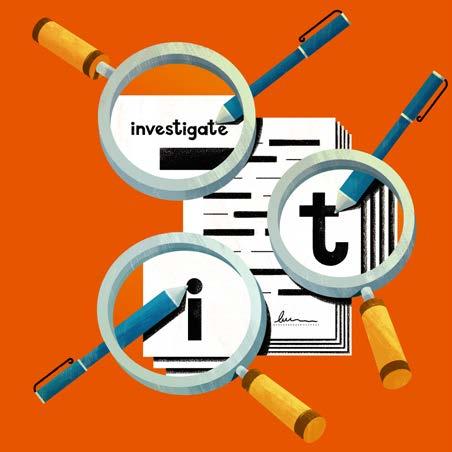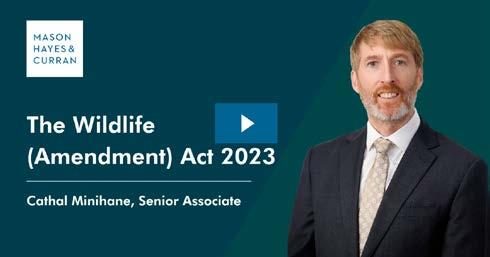Government & Public Sector Update In Brief

Q1 2024
Welcome

Welcome to the latest edition of our Government & Public Sector Update - In Brief series. In this interactive magazine, we feature our most popular insights from the past month. We hope you find it informative.
First up, in the above video, Public, Regulatory & Investigations senior associate, Cathal Minihane discusses how Wildlife (Amendment) Act 2023 places new reporting obligations on public bodies whose statutory functions could have an impact on biodiversity. Cathal examines what is required by public bodies to comply.
Other popular insights featured in this edition include:
• The anticipated COVID-19 public inquiry and three top tips for healthcare organisations that fall within its scope
• The Priority Legislative Programme announced by Government for spring
• An update on the Human Tissue Bill which will pave the way for organ donation in Ireland
• High Court confirms media can access court files
Please feel free to contact me or another member of our team if you wish to discuss these topics or any other issues impacting your organisation.

Catherine Allen Partner, Head of Public, Regulatory & Investigations callen@mhc.ie
Contact our Government & Public Sector Team
2 Government & Public Sector Update - In Brief
COVID-19 Inquiry: Further Developments in 2024
 Catherine Allen Partner, Head of Public, Regulatory & Investigations callen@mhc.ie
Catherine Allen Partner, Head of Public, Regulatory & Investigations callen@mhc.ie

We recently discussed in our article Inquiry of State’s Handling of COVID-19 Pandemic that an inquiry will be established by the Irish Government to investigate the handling of the pandemic in healthcare settings such as hospitals and nursing homes. Further updates indicate that the inquiry is likely to be “no-blame” and non-statutory in nature. Although the draft Terms of Reference have been circulated to Cabinet, they have not yet been published.
However, it is expected that there will be a particular focus on nursing homes and hospitals. The inquiry is also expected to last 12 to 18 months.
What can we expect the inquiry to look like?
The Terms of Reference for the inquiry are due to be made available to the public shortly and all indications are that it will take the form of a nonstatutory inquiry. A non-statutory inquiry is an inquiry that a Minister commissions into a matter of public importance. Unlike a statutory inquiry, or tribunal of inquiry, a non-statutory inquiry is not established by legislation. The main difference between statutory and non-statutory inquiries is that the former benefits from certain legal powers to compel the production of documents and examine witnesses. Non-statutory inquiries rely on voluntary co-operation.
Aoiffe Moran Partner, Public, Regulatory & Investigations amoran@mhc.ie
It is expected that the focus will be on longterm residential care facilities for older people, with an independent panel expected to make recommendations on how to strengthen pandemic decision-making. It is important for healthcare organisations that fall within scope to consider their potential obligations to the inquiry early in the process. To assist with this, we have outlined below our top three tips to consider.
Our three top tips for healthcare organisations
Healthcare organisations likely to be affected should start preparing as early as possible and bear the following in mind:
1. Immunities and privileges
A non-statutory inquiry does not entitle you to the same immunities and privileges as a witness before a court or a statutory inquiry. This means you are not entitled to “immunity from suit” and, accordingly, careful consideration should be given to any evidence or documentation that is put before a non-statutory inquiry.
3 Government & Public Sector Update - In Brief Financial Services Sector Update - In Brief
2. Document management and preservation
Preserve any documents that may be seen as relevant to the inquiry and ensure that documents of importance are not inadvertently shredded/ discarded. Any documents that you believe are likely to be relevant should be organised and reviewed to ensure that you are familiar with the contents of the documents and the potential for disclosure.
3. Watch out for legal implications around disclosure
Liaise with your data protection officer about documents that you are considering disclosing. Healthcare documents contain personal and sensitive data so it will be important to consider any potential legal implications of disclosure well in advance.
Conclusion
The terms of reference are still awaited. As matters stand, opposition parties have three weeks to comment and make proposals on the terms of reference before they are finalised.
By taking the pro-active steps outlined above, healthcare organisations can ensure that they are adequately prepared for the upcoming COVID-19 Inquiry.
Our experienced and dedicated Public, Regulatory and Investigations team has extensive experience advising in this area and is happy to assist and provide you with valuable legal advice on any issues that may arise.

4 Government & Public Sector Update - In Brief
Government Priority Legislation Spring 2024
 Catherine Allen Partner, Head of Public, Regulatory & Investigations callen@mhc.ie
Catherine Allen Partner, Head of Public, Regulatory & Investigations callen@mhc.ie

The spring Legislative Programme comprises 46 priority pieces of draft legislation (Bills). As with the last three legislative programmes these 46 priority bills are divided into two categories: 24 for priority publication and 22 bills marked for priority drafting in this Dáil term.
Chief Whip, Hildegarde Naughton TD, in announcing the Government’s spring Legislative Programme stated that “A key Government priority is ensuring that all members of society are safe on the streets and in their communities. Organised crime often preys on the most vulnerable with the Irish crime market valued at €1.7 billion per annum.”
This Legislative Programme is notable as it may be one of the last programmes presented by the current Government. The full programme can be accessed online.
We consider some of the key pieces of draft legislation below.
Housing and Property
This remains a priority feature. This term, the Government aims to introduce key measures to ensure continued supply and access to housing. The Registration of Short-Term Tourist Letting Bill requires all properties listed for short-term and holiday let to be registered with Fáilte Ireland. This will result in stringent requirements for those who
Laura Rattigan Senior Associate, Public, Regulatory & Investigations lrattigan@mhc.ie
operate holiday rentals for periods of up to and including 21 days, including potential prosecution for failure to hold a valid registration number.
The Residential Tenancies (Right to Purchase) Bill will afford tenants in rental properties a right of first refusal to purchase those properties when they are put up for sale. The aim is to protect tenants from eviction. It is also envisaged that the scheme will facilitate more convenient sales for landlords.
In addition, the Health (Miscellaneous Provisions) Bill seeks to remove certain income derived from the Rent-a-Room scheme from the Medical Card and GP visit income assessment process. The aim is to remove barriers to participation in the Rent-aRoom scheme, and therefore potentially alleviating the shortage of accommodation for students and other renters.
Public sector
The Civil Service Regulation and Public Service Management (Amendment) Bill will amend the previous Civil Service Regulations. The proposed legislation will provide that disciplinary action up to and including dismissal in the civil service can be assigned below the level of the head of the organisation.
Work is underway on the EU Data Bill which will transpose the EU Data Regulation into Irish Law. The aim of the Regulation is to create a harmonised framework within the EU on fair access and use
5 Government & Public Sector Update - In Brief Financial Services Sector Update - In Brief
of data, and to provide clarification on who can create value from data and under which conditions. This Bill needs to be passed into national law by 12 September 2025.
Health
Among the health legislation for priority drafting is the Health (Amendment) (Licensing of Professional Home Support Providers) Bill. This will provide a regulatory framework for the licensing of home support providers to ensure that all service users are provided with high-quality care in accordance with HIQA national standards. The new law will require all home support and home care providers to hold a licence from HIQA.
The Health (Amendment) (No. 2) Bill has been prioritised, following completion of pre-legislative scrutiny in December 2022. This Bill aims to strengthen regulatory measures to enhance governance and oversight of nursing homes and other designated centres. In addition, the Prohibition of Conversion Practices Bill aims to end the practice of conversion therapy in Ireland.
Finance
Following the Government’s Retail Banking Review in November 2022, the Minister for Finance proposed the Access to Cash Bill in an effort to preserve access to cash, and to regulate ATMs and Cash in Transit operators.
Policing and Defence
The Garda Síochána (Recording Devices) (Amendment) Bill is in preparation in the wake of the November 2023 Dublin riots. The purpose of this Bill is to allow Gardaí to use the controversial Facial Recognition Technology (FRT) in specific circumstances. It will allow Gardaí retrospectively to search images which are legally in the possession of An Garda Síochána regarding specific serious offences.
The draft of Defence (Amendment) Bill was approved in December 2023 following the publication an independent review group report into bullying, harassment and sexual misconduct within the Defence Forces. It will examine the effectiveness of policies and procedures within the Defence Forces for dealing with allegations of this behaviour. It give statutory footing to the Minister of Defence to authorise members of the defence forces to engage with trade unions, namely ICTU.
Miscellaneous
Preparation is underway for the drafting of The Forty-first Amendment of the Constitution (Unified Patent Court) Bill. This is to provide for the extension of the Unified Patent Court to Ireland, which will in turn provide a central forum for patent litigation in the EU. A date of June 2024 is presumed for a referendum, to coincide with the local and EU elections.
Work remains ongoing on the Defamation (Amendment) Bill in light of a statutory review of the Defamation Act 2009. The major areas identified for examination include a proposed end to jury trials in High Court defamation proceedings and measures against so-called SLAPPs (strategic lawsuits against public participation).
Conclusion
The 2024 spring Legislative Programme potentially marks the last Legislative Programme put forward by the current Government. This has given rise to several Bills put forward in an effort to align with their “Programme for Government”. Work has also continued on a number of key pieces of legislation from the summer and autumn Legislative Programmes. It remains to be seen which of these proposals will materialise this term.
For more information on the Government’s Legislation Programme, contact a member of our Public, Regulatory & Investigations team.
6 Government & Public Sector Update - In Brief
Organ Donation in Ireland Update on the Human Tissue Bill 2022
 Catherine Allen Partner, Head of Public, Regulatory & Investigations callen@mhc.ie
Catherine Allen Partner, Head of Public, Regulatory & Investigations callen@mhc.ie
Organ donation is currently unregulated in Ireland. The Human Tissue (Transplantation, Post-Mortem, Anatomical Examination and Public Display) Bill 2022 (the Bill), in its current form, will introduce an “opt out” organ donation system. This means, in simple terms, that organ donation will be the default position so that there will be a presumption in favour of organ donation unless a person has opted out of the scheme and has registered their objection to organ donation on the Relevant Organ Donation Opt Out Register. However, the Bill allows a family member to override any deemed consent.
The Bill is not without controversy. Some argue that the proposed system, in which deemed consent to donate organs can be overruled by the family of the deceased person, does not go far enough. Others argue that true consent from the donor cannot be obtained in an opt-out system.
Consent requirements
The Bill proposes that a person will be deemed to consent to organ donation, after death, where:
• They have not registered their objection to organ donation on the Register, and
• A registered medical practitioner is satisfied that a designated family member of the deceased person has confirmed that they have no objection to the organ donation
 Aoiffe Moran Partner, Public, Regulatory & Investigations amoran@mhc.ie
Aoiffe Moran Partner, Public, Regulatory & Investigations amoran@mhc.ie
The consent of the deceased person depends on certain conditions being met. These include requirements that the deceased person:
• Has been ordinarily resident in the State for at least 12 months prior to their death
• Had the capacity to understand that consent to donation would be presumed in the event of their death
What is a designated family member?
“Designated family member” is defined in the Bill to include a spouse, civil partner or cohabitant, a child, parent, grandchild, grandparent, uncle or aunt, niece or nephew or a close friend who can demonstrate that he or she can determine and accurately convey the wishes of the deceased person. The designated family member will be determined based on a hierarchy which is set out in the Bill.
7 Government & Public Sector Update - In Brief Financial Services Sector Update - In Brief
Postmortem practice and procedure
The Bill also seeks to regulate practice and procedure for postmortems. A postmortem may be carried out to find out more about an illness, cause of death, for medical research or education and training. This is known as a non-coronial postmortem. Separately, a coroner may order a postmortem in the case of an unexpected death.
Importantly, the Bill introduces a statutory requirement for consent for non-coronial postmortems. The Bill sets out a framework for how consent should be obtained and the information which must be provided to families to obtain such consent. A failure to obtain appropriate consent will constitute an offence.
The Bill also provides for regulation of the retention, storage, use, disposal and return of organs and tissue from deceased persons following all postmortems in hospital settings, for example, imposing retention periods for records and samples.
Coroners Act amendments
The Coroners Act 1962 is the principal legislation that governs the conduct of coroners. The Coroners (Amendment) Act 2019 strengthened coroner powers in relation to the investigation of deaths and inquests. The Coroners Acts 1962 – 2020 will also be amended by the Bill, to introduce the requirement for communication and information sharing with families where a coronial postmortem is required. This development comes as the Coroners Amendment Bill 2023, which was recently published, seeks to ease pressure on the Coroner Service. The public consultation closed on 19 January 2024 and proposals on changes to the coroner system will now be brought to government.
Comment
By way of next steps, when the Bill was considered in the Seanad Éireann in December 2023, the Minister for Health said that an amendment would be brought forward on Report Stage to align the Bill with the legislation on assisted decision-making. This will require an amendment to both the Bill and the Assisted Decision-Making Acts.
The Bill will be particularly relevant to hospitals and the Coroner Service, as well as charities and other organisations working within the transplant medicine field. For more information on the implications of the Bill, contact a member of our Public, Regulatory & Investigations team.
8 Government & Public Sector Update - In Brief
High Court Confirms Media Can Access Court Files
 Lisa Joyce Partner, Public, Regulatory & Investigations ljoyce@mhc.ie
Lisa Joyce Partner, Public, Regulatory & Investigations ljoyce@mhc.ie
The recent case of Law Society of Ireland v Ellis[1] considered the entitlement of the media to access and report on documents that are in a court file but have not been “read aloud” in open court. The respondent solicitor in the proceedings, Ms Ellis, was concerned that personal and professional matters concerning her had been leaked to the media after the case was heard. Therefore, she applied to the Court for permission to obtain a transcript of the digital recording of that hearing.
Background
The hearing in these proceedings took place in 2022. As is common practice, the trial judge had the opportunity to read the affidavit and accompanying exhibits submitted by the Law Society in advance of the hearing. As a result, the papers were not read out in court in full. However, the solicitor acting for the Law Society outlined the nature of the case relating to Ms Ellis in oral submissions to the Court.
When the proceedings concluded, Ms Ellis became concerned that the contents of the Law Society’s affidavit had been referred to by the print media despite the fact that it had not been read aloud in court. She alleged that the material had been “leaked” to the media and sought a transcript of the proceedings to determine what information had entered the public domain during the hearing.
Decision
Mr Justice Simons granted Ms Ellis’ request for a transcript of the earlier proceedings. However, he clarified that there was nothing untoward in the media having access to an affidavit that had not been read aloud in open court.
He emphasised that, apart from certain exceptions such as in family law proceedings, members of the print and broadcast media are generally entitled to report on anything that is relevant to court proceedings. This includes documents on the court file, such as affidavits, even where those documents have not been read out during a public hearing. This is because the documents still form part of the information and material on which the Court is relying to make its decision, and on which the exchanges between judge and counsel are based.
Mr Justice Simons noted the constitutional requirement of Article 34.1 of the Constitution that justice be administered in public. He also referred to his previous judgment in Re Independent News and Media plc,[2] which noted that section 159(7) of the Data Protection Act 2018 allows the disclosure of personal data contained in a court record for the purpose of facilitating fair and accurate reporting of a case.
[1] [2023] IEHC 728
[2] [2020] IEHC 384
9 Government & Public Sector Update - In Brief Financial Services Sector Update - In Brief
Conclusion
This judgment reiterates that, as a general rule, the media are entitled to access and report on the contents of any documents on the court file, even if those documents have not been read out in open court. It is important for litigants to be aware of this, particularly given the increasingly common practice of judges reading court papers ahead of time, to improve the efficiency of court hearings.
There are exceptions, such as in family proceedings, or if an application has been made for privacy on the basis that other constitutional rights of the person concerned override the requirement of publicity. However, where a decision limiting reporting is made, the courts will put in place the least restrictive measures possible, given the importance placed on the public administration of justice.
For more information and expert advice, contact a member of our Public, Regulatory & Investigations team.

10 Government & Public Sector Update - In Brief
Public Law
We are recognised as the premier public sector practice in Ireland.
We have a deep understanding of the public and regulated sector environment and the governing laws and regulations. Our expertise covers all areas from strategic advice on governance issues to statutory interpretation and legislative drafting. A core practice area of our team is judicial review and public law litigation, including contentious public procurement matters.
We have specialist expertise in advising and acting for clients in public and private inquiries of any kind – both statutory and non-statutory.
We have a deep understanding of the way public bodies function and the environment in which they operate. We specialise in advising public sector clients on what statutory bodies can properly do, and the procedures they must follow.
Our team is a national leader in professional regulation. We have extensive experience and knowledge, and act in numerous professional regulatory sectors.
We also understand that the legal environment surrounding public bodies is increasing in complexity, as pressures for efficiency and value must be reconciled with requirements of transparency, accountability, and procedural fairness.
About Us
We are a business law firm with 117 partners and offices in Dublin, London, New York and San Francisco.
Our legal services are grounded in deep expertise and informed by practical experience. We tailor our advice to our clients’ business and strategic objectives, giving them clear recommendations. This allows clients to make good, informed decisions and to anticipate and successfully navigate even the most complex matters.
Our working style is versatile and collaborative, creating a shared perspective with clients so that legal solutions are developed together. Our service is award-winning and innovative. This approach is how we make a valuable and practical contribution to each client’s objectives.
What Others Say
Dublin London New York San Francisco The contents of this publication are to assist access to information and do not constitute legal or other advice. Readers should obtain their own legal and other advice as may be required. © Copyright 2024. Mason Hayes & Curran. March 2024. Government & Public Sector Update - In Brief
Our Public Law Team Our Public Law Team Legal 500 Legal 500 “Enormous depth of knowledge and experience…” “I would describe MHC as my most important advisers and it’s of huge help to me to know I have the team at MHC in my corner.”




 Catherine Allen Partner, Head of Public, Regulatory & Investigations callen@mhc.ie
Catherine Allen Partner, Head of Public, Regulatory & Investigations callen@mhc.ie



 Lisa Joyce Partner, Public, Regulatory & Investigations ljoyce@mhc.ie
Lisa Joyce Partner, Public, Regulatory & Investigations ljoyce@mhc.ie
